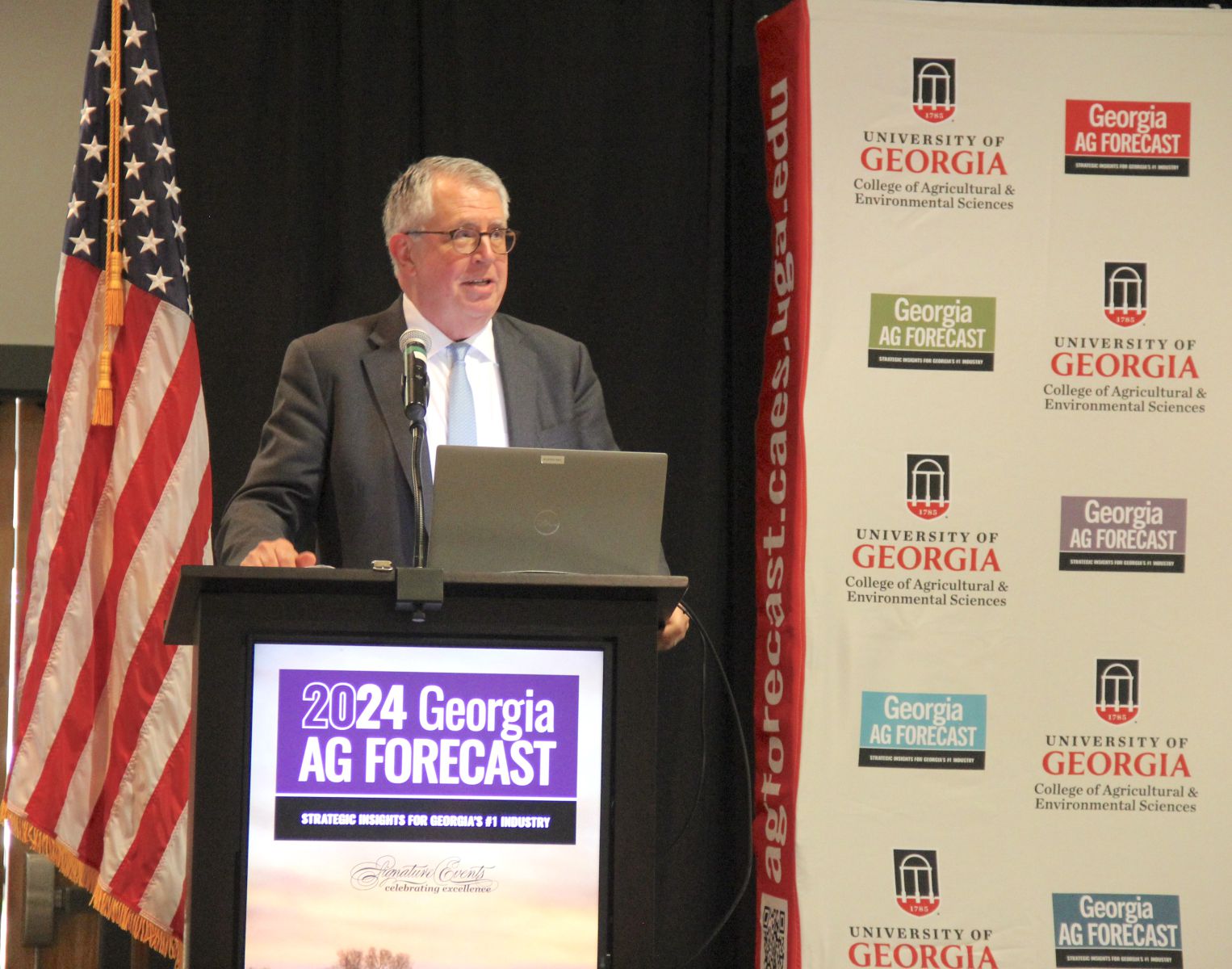Ag News
Ag Forecast features economic outlook, farm bill update, farmer of the year
Posted on Feb 02, 2024 at 22:25 PM
A positive takeaway from the 2024 Georgia Ag Forecast held Jan. 26 in Tifton is Georgia’s chances of experiencing a recession this year are only about 33% compared to the United States having a higher probability of just under 50%.
Dr. Gopinath Munisamy, distinguished professor of agricultural marketing at the UGA College of Agricultural & Environmental Sciences (CAES), expects the U.S. economy will see a slowdown in its gross domestic product (GDP) – the market value of all the goods and services produced here. He forecasts Americans will invest less this year and there will be a modest increase in the unemployment rate. We will probably see lower growth in U.S. government spending and lower growth in exports of U.S. products.
Georgia’s economic development successes, stronger demographics, resilient labor market and having households in strong financial health are reasons UGA agricultural economists think Georgia will only see an economic slowdown instead of a recession. However, a misstep by the Federal Reserve with interest rates, a financial crisis or an energy price shock could each trigger a recession according to economic analysis provided by the UGA CAES.
CAES economists say inflation will continue to ease, but don’t expect prices to fall to pre-pandemic levels.
Risks threatening the U.S. economy this year include possible defaults and delinquencies on loans, especially in commercial real estate, because of higher interest rates implemented to slow inflation. The geopolitical conflicts in the Middle East, Ukraine/Russia, and China pose another risk, Munisamy said.
The CAES hosted its annual event at the UGA Tifton Campus to give Georgia farmers, ag lenders and ag leaders a broad view of where the state’s No. 1 leading industry stands economically.

Dr. Gopinath Munisamy, distinguished professor of agricultural marketing at the UGA College of Agricultural & Environmental Sciences, delivered an economic status report for U.S. & Georgia agriculture. / Photo by Jennifer Whittaker
Ag numbers
On the national level, the USDA is forecasting that the net farm income for 2023 will be $151.1 billion, down $31.8 billion from 2022’s net farm income of $182.8 billion. Munisamy says reasons for the net income drop can be attributed to crops and livestock prices falling about 5% from 2022; an increase in production expenses and interest rates of about 3.5% for crops and livestock; and about a 22.3% decrease in government payments.
Georgia’s 2022 net farm income was $5.2 billion per USDA data, Munisamy said, making our state 13th for net cash income. This is the highest net farm income Georgia has seen since 2017 when it reached about $3.5 billion and 2014 when it was about $3 billion. Georgia’s net farm income dropped to just over $2 billion in 2020. Munisamy said Georgia’s 2023 net farm income is likely to fall to the last 10-year average of $3 billion.
However, farm expenses have steadily risen since 2020 and reached an historic high of about $9 billion in 2022. Farm input costs continued to increase last year, but when adjusted for inflation remained below 2014’s record highs. Ag production expenses are expected to drop slightly this year with the largest changes seen in interest, fertilizer and pesticide costs.
Higher labor costs pose a threat to Georgia’s 2024 ag economy. Unexpected increases in fertilizer or chemical costs are other possible risks. Georgia fruit and vegetable growers continue to lose income due to cheaper imports coming in to the U.S. from Mexico and South America during Georgia’s growing season.
Exports matter
Georgia exported $3.86 billion worth of agricultural commodities in 2022, Munisamy said, ranking Georgia 18th in the U.S. for ag exports. Cotton, poultry & eggs, peanuts, fruits & vegetables and tree nuts are the major commodities Georgia exports.
This year, Munisamy expects there could be a higher export demand for Georgia poultry products due to population and income growth overseas coupled with limited supplies of other meats such as beef. But he cautioned that geopolitical conflicts could dampen export demand.
“Because fruit and vegetables are considered crucial to a balanced diet there is no support in Congress to limit imports and also because Congress is afraid of creating a trade war,” Munisamy said.
China is one of the biggest importers of row crops to feed and clothe its country, which is important to Georgia, especially cotton. How much China imports will depend on their economy and the cost of U.S. commodities on the world market and how much other countries, like Brazil and India, produce.
“I think we need to keep markets open rather than sanctioning markets,” Munisamy said. “We stopped selling pork to Russia and they became one of the biggest pork exporters. Finding new markets to replace trade relationships already established is expensive and takes time.”
Farm bill showdown
Bob Redding, president of the Redding Firm, discussed the status of the farm bill. / Photo by Jennifer Whittaker
March 1 is a crucial date for the fate of the farm bill.
“Now that Congress delayed voting on the funding bill until early March – March first is the trigger point for the USDA and ag funding. March eighth is the deadline for resolving funding for other programs,” said Bob Redding, president of the Redding Firm, which represents multiple ag organizations on Capitol Hill. “Something has to happen: either another continuing resolution to last until the end of the fiscal year, or they actually do the bills, or the government shuts down.”
Appropriation bills for Energy-Water, Military Construction-VA and Transportation-HUD programs also expire March 1, according to the Committee for a Responsible Federal Budget. Appropriation bills for Commerce-Justice-Science, Defense, Financial Services-General Government, Homeland Security, Interior-Environment, Labor-HHS-Education, Legislative Branch, and State-Foreign Operations programs expire March 8.
There’s a good possibility that the deadline for submitting the 2025 budget will come before the new farm bill is finished, Redding said.
The most recent farm bill was set to expire Sept. 30, 2023, but Congress passed a continuing resolution last year that extends it through the end of fiscal year 2024.
“There’s no additional money for the farm bill, so we’re operating [writing a new bill] with no new cash,” Redding said. “Crop insurance and production risk programs are losing shares. Nutrition programs are still the biggest segment of the farm bill. ”
According to a report issued by Senate Ag Committee Republicans based on numbers provided by the Congressional Budget Office last May, federal nutrition programs, such as school lunch and the Supplemental Nutrition Assistance Program (SNAP), account for 81.1% of farm bill spending at $1.22 trillion. Crop insurance programs account for 6.7% of the farm bill budget at $101.3 billion. Commodity and related programs make up 4.5% of the bill’s budget at $68.6 billion and conservation programs to protect soil, water and air are allocated $60 billion at 4% of the budget.
Last year, Georgia farmers Karla Baker Thompson and Daniel McMillan testified during hearings before Congressional members working on the farm bill, Redding said. Thompson and McMillan both asked Congress to: allocate more funding for crop insurance programs, increase row crop reference prices to help farmers contend with their input costs that have increased significantly since the last farm bill was written; and the chance for farmers participating in commodity programs to do a voluntary update of their base acres for crops to let younger growers into the programs.
Farm bill politics
Redding stressed the importance of farmers supporting Political Action Committees to advocate for ag issues as production agriculture’s power lessens.
“The Southeast doesn’t have a strong reputation for supporting PACs, but as our numbers decline this is going to be an avenue to get a voice,” Redding said. “Support of a PAC is the piece that needs to increase in the Southeast.”
Redding said although 92% of all production agriculture happens in Republican districts, support from Democratic lawmakers is vital to pass a farm bill.
“We’re blessed in Georgia that Reps. Sanford Bishop and David Scott are supporters of the farm bill,” Redding said.
Rep. Bishop plays a crucial role for ag funding as a member of the House Appropriations Committee and as the ranking member of its subcommittee on Agriculture. Rep. Scott is the ranking member of the House Agriculture Committee.
Bruce Redmond named Georgia Farmer of the Year
A highlight of the Georgia Ag Forecast was UGA Extension announcing Effingham County’s Bruce Redmond, second from right, as the 2024 Georgia Farmer of the Year. Congratulating Redmond on the honor were from left, UGA CAES Dean & Director Dr. Nick Place, Effingham County Extension Agent Blake Carter & UGA Extension Assistant Dean Dr. Mark McCann. / Photo by Jennifer Whittaker
Redmond will vie against farmers from nine other Southeastern states for the title of Sunbelt Ag Expo Southeastern Farmer of the Year. The award recognizes excellence in agricultural production and farm management along with leadership in farm and community organizations. The winner will be announced Oct. 15 at the Sunbelt Expo luncheon.
Redmond started farming on his own raising peanuts and cotton. He took over the family's operation, Shiloh Farms, after his dad, Larry, died in 2018. Today, Bruce farms 2,800 acres of rented and owned farmland, including both dryland & irrigated acres of peanuts and cotton. Shiloh Farms has grown certified Tifton 9 bahia grass seed since the 1990s and is now the largest producer of certified Bahiagrass seed in the Southeast.
Redmond has served on his local USDA Farm Service Agency Committee for seven years. He supports Effingham County 4-H and the Effingham Young Farmers Association, and is an Effingham County Farm Bureau member.
He was named the 2023 Effingham County Friend of 4-H, the 2022 Georgia Outstanding Young Farmer by the Georgia Association of County Agricultural Agents, and the 2012 Young Farmer of the Year by the Effingham Young Farmers Association.
In 2021, he was recognized as the Conservationist of the Year by the Ogeechee River Soil and Water Conservation District, who honored his father with the same recognition in 1993.
Redmond and his wife, Jillian Redmond, have three daughters, Lainey, 8; Ellie, 4; and Shiloh, 2.
“This is a great moment to remember the greatest asset of Georgia agriculture, and that's the Georgia farmer. Never forget that,” said Mark McCann, assistant dean for UGA Extension, who presented the award. “Each year, we solicit nominations from county agents across the state for outstanding and innovative farmers.”
- Categories:
- Tags:

